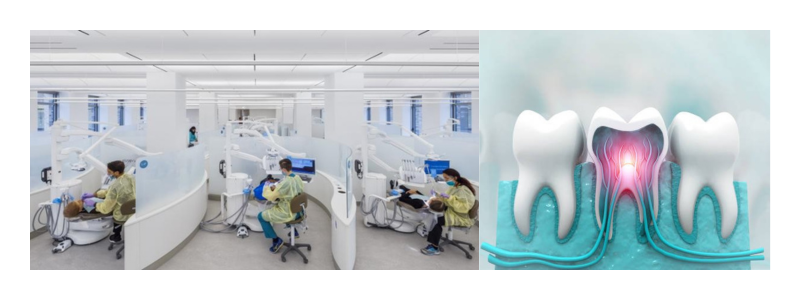Dental Center

Fluoride in Dental Care
Fluoride occurs naturally. It plays an important role in the maintenance of dental health. It helps to prevent tooth decay. It makes tooth enamel more resistant to acid attacks. It prevents plaque bacteria and sugars in the mouth. It reverses early decay by remineralizing weakened enamel.
There are two main sources of fluoride.
- Systemic factors such as fluoridated drinking water and supplements
- Topics such as toothpaste and mouthwash.
Many communities add fluoride to their water supply. It provides them with an easy and effective way to help reduce cavities. Many toothpastes containing fluoride are available on the market. It is the simplest way to protect your teeth. The dentists suggested that pea-sized amounts should be used by children. A child should be supervised by a parent to avoid swallowing excessive amounts of paste while brushing. Sometimes, dentists apply fluoride varnish during the regular checkups. It helps to enhance tooth protection. It is safe and effective to use it.
Consuming an excessive amount of fluoride can cause dental fluorosis. Fluoride should be used according to your dentist’s guidelines.
Dental Checkups
Dental care is very important. A dentist must visit regularly. Dentists recommend these visits after every six months. The frequency of such visits depends on a person’s needs and dental history. These visits are helpful in the early diagnosis of several dental issues. These issues are treated at their early stages.
During these checkups, a dentist or hygienist will clean your teeth by removing plaque and tartar. It will help you to prevent gum disease and tooth decay. They will also polish your teeth and guide you on how to maintain your oral health at home.
The steps taken in these checkups are given below:
Dental X-rays: They may be taken to detect issues that are not visible during the visual exam. Such matters included cavities and bone loss.
Dental Exam: A dentist will check your gums, tongue, throat and tender tissues. Such an examination will assist them in the diagnosis of oral cancer and other disorders.
When the dental problems are seen at an early stage, the treatment costs you less. Your regular checkups enable you to maintain the good health of your teeth. It brings you confidence concerning your general oral health. When you miss these visits, you may develop severe tooth problems. Your visits should also be regular.
Healthy Gums Maintenance
The basis of a healthy mouth is healthy gums. They hold your teeth and prevent the offensive bacteria. Gums may get inflamed due to a lack of sufficient care, causing gingivitis and periodontal disease of periodontal which may lead to loss of teeth and other health complications.
The initial way of having healthy gums starts with standard daily oral hygiene. Tooth brush with a soft toothbrush, twice everyday using fluoride toothpaste. It is important not to forget to floss at least once per day to get rid of plaque and food debris between the teeth and along the gumline, which your toothbrush can never reach.
The role of a healthy diet is also important. It is important to avoid using sugary snacks and drinks. Eat foods rich in vitamins and minerals. These nutrients help to prevent inflammation. Visit your dentist regularly to prevent gum diseases. They will examine and clean your teeth. A dentist is capable of clearing hardened plaque. They will identify any signs of gum disease early before it becomes worse.
Bleeding during brushing, constant foul breath, gum recession or swelling are indications of a gum problem. When you see any of them, visit your dentist immediately.
Children’s Dental Care
Proper care of the teeth of your child will create a lot of anticipation of oral care even in adulthood. The process of dental care must start as early as possible before the onset of the first tooth. Gently brush the inside of your baby’s gums using a soft and moist cloth after feeding.
Initial dentist appointment must occur at the age of one or six months after the emergence of the first perimeter. Early visits help your child get used to the dentist and the early identification of problems.
Children are at high risk of dental cavities because they have baby teeth. These teeth are still developing enamel because they snack a lot. Reduce the amount of sugary foods and beverages. It also promotes the use of water, particularly fluoridated one. It can be easy to brush your teeth and floss them while listening to music. It will be fun for your child. It helps them to create good habits.
Children’s teeth can receive additional protection. Use sealants and fluoride administration done by a dentist. Parental supervision is needed for a child to have the correct technique as well as enough time to brush.
Handling Dental Emergencies
Tooth emergencies might set in at any time and need fast thinking to avoid permanent damage. If there is a knocked-out tooth, a bad toothache or a broken crown, the thing is that the awareness of how to react can help a lot.
Reach quickly for a permanent tooth that is knocked out. It is picked up by the crown and washed the dirt, without risking the socket. If it is not possible, put it immediately in milk or a tooth preservation solution and get to the dentist as quickly as possible. It needs to be done quickly, or in less than 30 minutes.
In case of a severe toothache, you can rinse it with warm water. Floss carefully to release food particles, and also place a cold compress over the body of your cheek. The aspirin should not be applied directly to the gums since it may damage the tissues.
